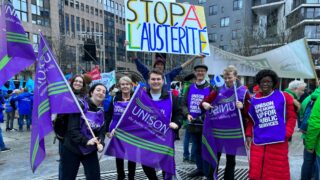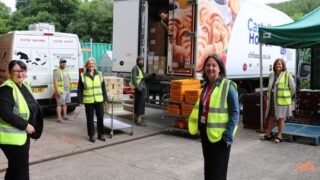Central government cuts to council budgets are forcing local authorities to rely on tip-offs from the public to combat alcohol being sold to children, UNISON has warned.
In the run-up to the Christmas party season, the public service union has raised concerns about a dramatic fall in the number of test purchases being carried out to detect illegal sales of alcohol to minors. It follows reports last month that in the past four years, just 16 people have been convicted in the UK of buying alcohol for a child.
Figures seen by UNISON from the south east of England reveal that 1421 test purchases for alcohol were done by trading standards officers across the region in 2009/10, the year before the government embarked on its austerity drive. By 2012/13 the number of test purchases had fallen by nearly 40% to just 858. Of the individual councils giving data, three quarters carried out fewer test purchases in 2012/13 than they did in 2009/10.
Statistics published by the Department for Communities and Local Government* show that councils’ budgeted spend on trading standards services has fallen by 26% in the three years between 2010/11 and 2013/14. This is a cut of £46m taken out of services across England. In the last year alone, budgeted spend on trading standards fell by 11.5%.
Helga Pile, UNISON National Officer, said:
“It is completely unacceptable that councils are relying on tip-offs from the general public. Trading Standards is a key council function that is being decimated by spending cuts and staffing reductions.
“Without the threat of regular test purchases acting as a deterrent, there is a real fear that unscrupulous traders will be emboldened. Slip-ups through lack of vigilance or inexperienced staff are more likely to go undetected.”
The trend on test purchases seen in the south east is likely to be reflected across the country. A UNISON report** based on FoI data from across the UK found that between 2009/10 and 2011/12 the number of test purchases on all age restricted goods fell by 25%.
Steven, a Trading Standards Officer in the south east of England, said:
“Due to staffing cuts locally we are doing fewer test purchases year on year, but on the ones we are doing, we’ve started to see the numbers of illegal sales ticking up. We’re not sure why – it could be linked to the difficult trading climate for businesses. But we’re worried that if we do less and less, we lose the deterrent effect. This could undermine recent progress on reducing underage drinking in the UK.”
Festive facts
It is also illegal to sell:
- Christmas crackers to children under 12
- Party poppers to children under 16
- Liqueur chocolates to children under 16
ends
Notes to Editors:
- Test purchases are where trading standards use volunteers under the age of 18 to attempt to purchase alcohol. Shops or premises selling the alcohol can face fines of up to £5000. Persistent offenders may be fined up to £20,000 and lose their licence.
- *DCLG Source data:
- **The ‘Damage’ report is available at http://bit.ly/1cbscIo
- Underage drinking has been in the news recently with think tank Demos calling for a crackdown on people buying alcohol for children: http://www.bbc.co.uk/news/health-25047079
-
The Home Office has recently consulted on scrapping the personal license system where a retailer or licensed premise has to have a personal license to sell alcohol: https://www.gov.uk/government/uploads/system/uploads/attachment_data/file/239260/Alcohol_consultation_personal_licences.pdf
This national system means licenses can be denied to people who have criminal convictions for certain crimes. Trading standards members speaking to UNISON believe this would be a damaging step because to obtain a license individuals have to complete government accredited training which helps ensure they understand the law and their responsibilities. The government’s proposals would leave it up to local licensing authorities to decide whether to require training to be completed as a condition of their license.





